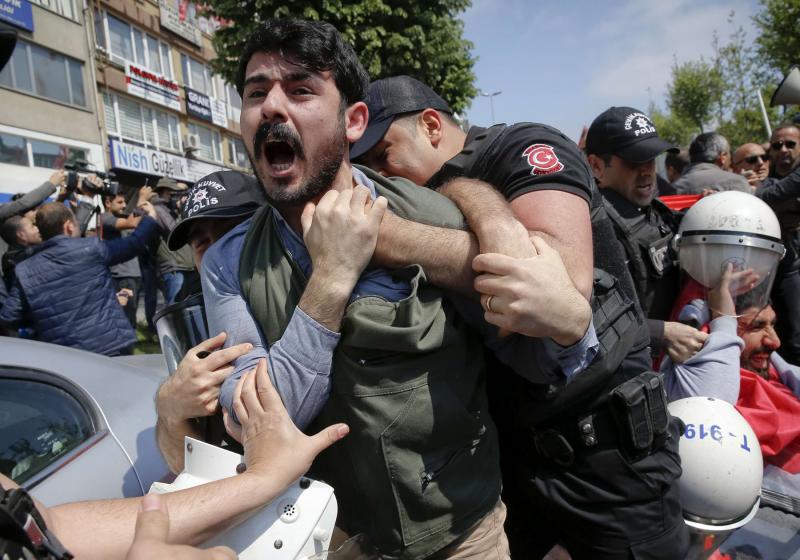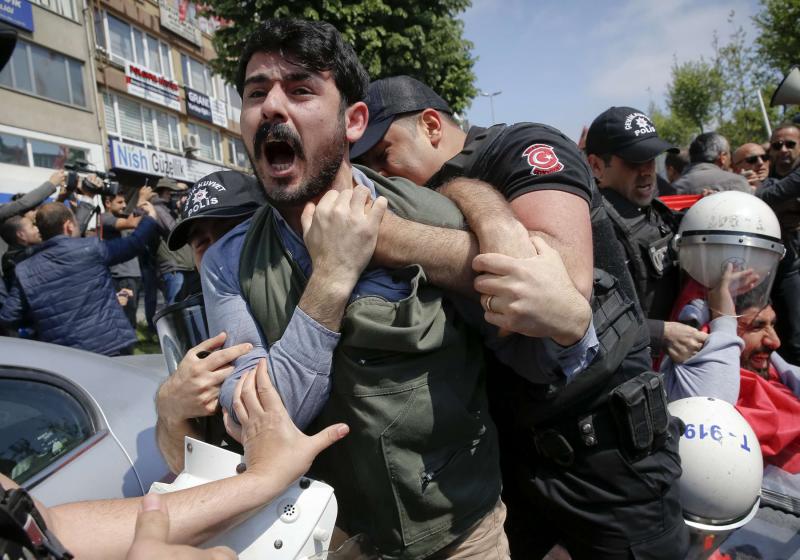Turning Turkey into a ‘zombie’ nation of undesirables
A recent row during a Turkish parliamentary commission meeting spoke volumes. “We are cleansing everybody,” said the legislative body’s chairman, a member of the ruling Justice and Development Party (AKP).
“Everybody” means all who disagree with the AKP. “Cleansing” is the pattern established by the party of dismissing “everybody” from state institutions and public office. With Turkey in the third year of the post-coup period, the purge has not slowed.
Discontent is being voiced. “Look, esteemed chairman,” roared Kurdish MP Meral Danis Bestas, “when the time comes and when you become subject to criminal charges, I and my friends will not hesitate to come to your legal defence but, now, what do you think you are doing by saying you are cleansing everybody? You have fired judges, police officers, gendarmerie officers, teachers, engineers, doctors. Who do you think you are?”
The discussion occurred while parliament considered a controversial draft bill that would restrict private employment for doctors dismissed from public health institutions by presidential decree on the accusation they were affiliated with terrorist groups.
A report by Amnesty International puts the number of people purged after the July 2016 failed coup at approximately 150,000. They include bureaucrats in central government ministries, as well as administrative officials at the local level.
As Bestas said, there are judges, police officers, gendarmerie officers, teachers, engineers and doctors among them. Amnesty International, which talked to nearly 900 officials fired, concluded there was no hope for them to live normally again, let alone return to their posts. A complaints commission, which has been at work for more than a year, has done almost nothing about objections raised by those dismissed, Amnesty International said.
The legislation, which is on its way to a parliamentary vote, is an especially severe act of purging. In some provinces in Turkey, the shortage of doctors and health staff is causing problems. Opposition members often raise the issue, only to find they are not properly heard in a parliament dominated by the de facto nationalist Islamist AKP-MHP (National Movement Party) coalition. Additionally, Turkey’s new executive presidency means parliament is all but paralysed.
There is a clear pattern in the groups targeted by the purge. It reveals the strategic goal of Turkish President Recep Tayyip Erdogan’s government, an intense blend of hard-line cadres of nationalists and Islamists. Despite the time since the failed coup, the opposition within and outside parliament say the Turkish state is determined to arbitrarily turn the following groups into the “living dead” — Gulenists, Kurds who sympathise with the Peoples’ Democratic Party, secularists and leftists in general.
In the official view, these groups are internal enemies of the state and society.
If the bill passes, certain doctors will be banned from practising medicine even in the private sector. Why? Why are doctors targeted so severely? Traditionally, this profession has been dominated by left-leaning secularists, especially in the western half of Anatolia and the mainly Kurdish provinces in south-eastern Turkey.
Erdogan knows he would probably never win them over. What is about to happen to doctors is the same as with some other professions, such as the law. Many dissenting lawyers are either in jail or stripped of the right to practise. The official response to perceived disloyalty is the ultimate punishment — relegation to the zone of the living dead. It doesn’t seem to matter that this is self-destructive for a country that faces a shortage of qualified workers.
Amnesty International’s gloomy conclusions may be correct. If the strategic goal feared by the opposition is achieved, millions of citizens will have been turned into what one journalist described as “zombies” because they’re “undesirable.”
This is not the first time society will have faced such a tragic phenomenon. It happened in Germany and the Soviet Union in the 1930s and in Eastern Europe until the fall of the Berlin Wall.
Little surprise then that many of Turkey’s elite have started to seek a life elsewhere. They are joining an exodus, the departure of those who are rapidly losing hope that Turkey will go in the right direction.
Yavuz Baydar is a senior Turkish columnist, and news analyst. A founding member of the Platform for Independent Journalism (P24) in Istanbul, he has been reporting on Turkey and monitoring media issues since 1980. A European Press Prize Laureate in 2014, he is also the winner of Germany's 'Journalistenpreis' in 2018.
This article was originally published in The Arab Weekly.







